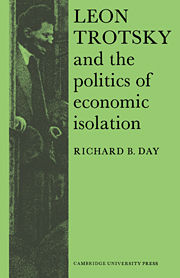Book contents
- Frontmatter
- Contents
- Preface
- Part one THE DILEMMA OF ECONOMIC ISOLATION
- Part two THE POLITICS OF ECONOMIC ISOLATION
- 4 The search for a new faith
- 5 Socialism in One Country
- 6 Trotsky's alternative
- 7 Trotsky's attack on socialism in a ‘separate’ country
- 8 Integrationism in defeat and exile
- Bibliography
- Notes
- Index
- CENTRE FOR RUSSIAN AND EAST EUROPEAN STUDIES UNIVERSITY OF TORONTO
5 - Socialism in One Country
Published online by Cambridge University Press: 25 October 2009
- Frontmatter
- Contents
- Preface
- Part one THE DILEMMA OF ECONOMIC ISOLATION
- Part two THE POLITICS OF ECONOMIC ISOLATION
- 4 The search for a new faith
- 5 Socialism in One Country
- 6 Trotsky's alternative
- 7 Trotsky's attack on socialism in a ‘separate’ country
- 8 Integrationism in defeat and exile
- Bibliography
- Notes
- Index
- CENTRE FOR RUSSIAN AND EAST EUROPEAN STUDIES UNIVERSITY OF TORONTO
Summary
Co-authoring the doctrine of Socialism in One Country, by the spring of 1925 Bukharin converted Stalin's contentious essay on the fictitious perils of ‘Trotskyism’ into a coherent view of Russia and the world. Among those struggling for Lenin's mantle, theory had become an instrument of power. Lenin's own authority had been based as much upon his polemical skills as upon organizational and manipulative insight. And his successor would likewise require recognition as both organizer and thinker. By imparting a wider, practical significance to Stalin's originally limited and purely abstract formulations, Bukharin significantly advanced the party secretary's plans for total personal power. As early as June 1924 Stalin had already begun to ‘correct’ the occasional theoretical error of Zinoviev and Kamenev. Now, with Bukharin's help, he seemed to be taking creative initiatives of his own.
Socialism in One Country was more than a slogan or even an economic programme: it was a psychological watershed in the history of the revolution. The party had reached the point where many longed for a reconfirmation of purpose. For three years, during the holding operation designed by Sokol'nikov, a sense of drift, aimlessness and confusion had been taking hold. The new doctrine helped to restore the sense of mission which had been lost in 1921. During the first months of 1925 an awareness of change became steadily more pronounced. With industry completing its recovery many of the old fears seemed less enormous than in the past.
- Type
- Chapter
- Information
- Leon Trotsky and the Politics of Economic Isolation , pp. 105 - 125Publisher: Cambridge University PressPrint publication year: 1973

